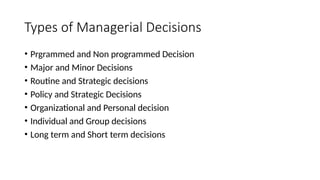Decision Making Demonstrate leadership Manage change
- 1. Decision Making By: Prof. Sharon Rajendra Manmothe MSc. (CS), SET, PhD Scholar (Atmiya University Gujrat)
- 2. A decision is a mental or cognitive process of choosing between two or more alternative courses of action.
- 3. ? Personal Choices ? Financial Decisions ? Health and Wellness Decisions ? Work and Career Decisions ? Relationship Decisions ? Educational Decisions ? Housing Decisions ? Travel and Vacation Decisions ? Ethical and Moral Decisions ? Social and Networking Decisions ? Consumer Choices ? Time Management Decisions ? Technology Decisions
- 4. Importance of Decision Making ? Achieve goals and objectives ? Allocate resources ? Solve problems ? Make trade-offs ? Manage change ? Demonstrate leadership ? Build trust and respect ? Create a positive work environment
- 6. Techniques of Decision-Making- Programmed ? Linear Programming Maximize profit = 100C + 75S
- 7. Queuing Theory Queueing theory aids decision-making by optimizing resource allocation, improving service quality, managing congestion, and enhancing system performance in various fields.
- 8. Game Theory ? Game theory is a mathematical framework for analyzing strategic interactions and making rational decisions in situations involving multiple decision-makers.
- 10. Simulation
- 11. Modern Techniques for Making Non- programmed decision ? Brainstorming ? Nominal Group Technique ? Delphi Technique ? Consensus Mapping ? Participative Techniques ? Heuristic Techniques
- 12. Types of Managerial Decisions ? Prgrammed and Non programmed Decision ? Major and Minor Decisions ? Routine and Strategic decisions ? Policy and Strategic Decisions ? Organizational and Personal decision ? Individual and Group decisions ? Long term and Short term decisions
- 13. Essential of sound Decision-making ? Well-defined problem ? Fact-based ? Objective-oriented ? Proper Timing ? Flexibility ? Communication ? Seek Feedback
- 14. Directing and Leadership ? Directing is the process of instructing, guiding, and motivating employees to achieve organizational goals. It is one of the four key functions of management, along with planning, organizing, and controlling.














